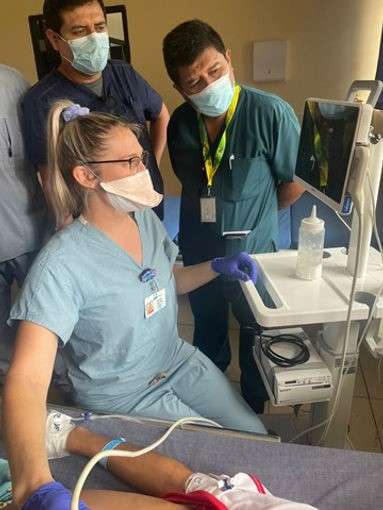Pediatric Residency Program Global Health Partner Sites
Iquitos, Peru
The UCLA Mattel Children’s Hospital, in conjunction with the UCLA Program in Global Health NGO Partners for Pediatric Progress, has established relationships with the medical community in the Amazon region of northern Peru.

The city of Iquitos is encircled by rivers and rainforest and is the world’s largest city that has no roads connecting it to the outside world – Iquitos can only be reached by airplane or boat. Iquitos is also the starting point for many tourists to explore the Peruvian Amazon. If it does not conflict with the dates of your rotation, during your trip you can explore the Pacaya Samiria National Reserve, the biggest government-protected natural area in South America's floodable Amazonia and one of the best places to see animals in the wild.
The inpatient experience is in the Pediatric ICU and wards of the Hospital Regional de Loreto (HRL). This is a government hospital and the main public referral hospital for all of the Peruvian Amazon. The hospital serves over a million residents in the city and surrounding rural communities of the Amazon basin. Some of the patients have traveled for over two weeks by boat to reach medical attention. You will work alongside your Peruvian resident counterparts from the Universidad Nacional de la Amazona Peruana and be supervised by attending faculty members in pediatrics.
Most of the community, patients, nurses, and doctors will speak Spanish and will conduct rounds, teaching, and patient care in Spanish. It is recommended that you be fluent in Spanish for this rotation. You will round with the team and may be asked to provide assessment of patients on rounds, participate in teaching conferences, and assist in UCLA-HRL training activities (including mock codes, hand hygiene education, antibiotic stewardship, and other on-going activities). The medical community at HRL is eager to share their knowledge of tropical disease and exchange information on how treatment differs in settings with different resources. Commonly seem illnesses include respiratory illnesses, diarrhea, parasite infections, malaria, and dengue fever.
During your elective you may also be invited to participate in outreach boat trips to rural communities with the community physicians to conduct fever checks, malaria net distribution, vaccination campaigns, malnutrition screenings, or other health activities.
Current and Prior Resident Scholarly Work
- Point of Care Ultrasound (POCUS) and FASH

Additional Resources
- NBC News Coverage of UCLA Medical Students and Residents in Iquitos
- Kiran Mitha: Covid-19 is testing the limits of the fragile healthcare system in Peru’s Amazon Region
- A Walking and Driving Tour of Iquitos
Application Details:
- Maximum residents to be accommodated is 2 at one time but open to residents throughout the year.
- Intermediate-advanced Spanish required.
- Approximate expenses $2000.
- Best time of year January – April. (Rainy season is November – March)
- UCLA 4th year medical students rotate here mid-March through April if you’d like to overlap with them.
- Mentor in Iquitos is Dr. Nadiuska Rosas